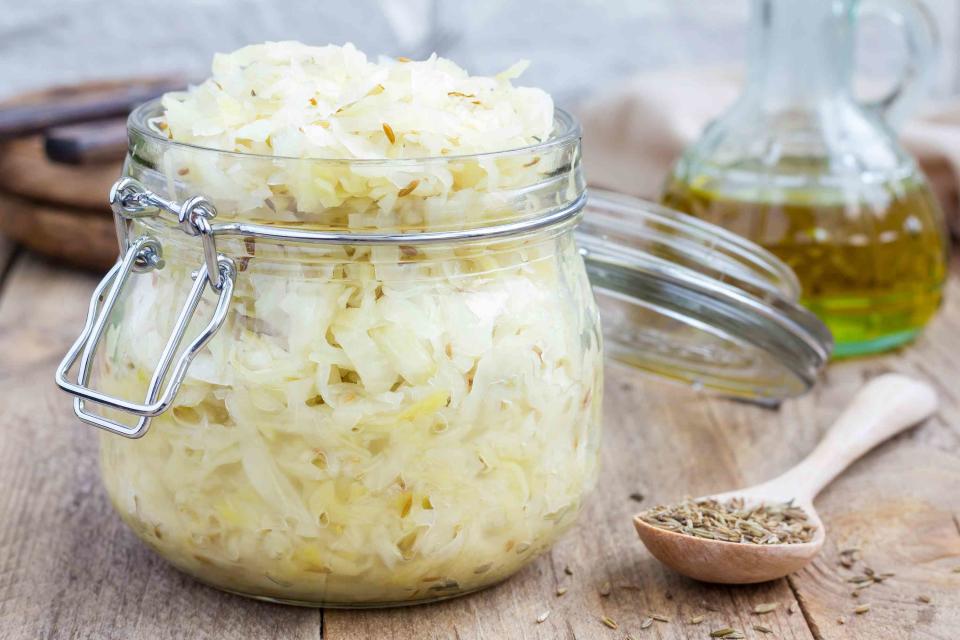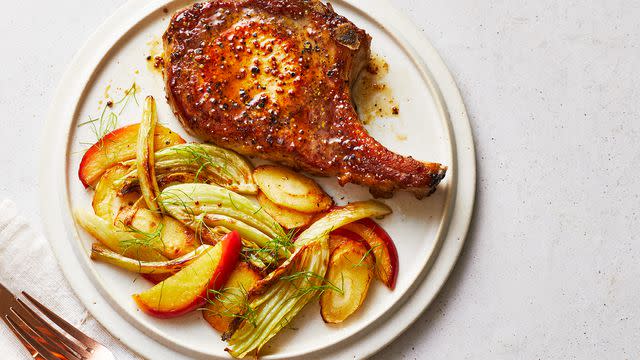Sauerkraut Is Surprisingly Good for Immunity and Gut Health—Here's Why R.D.s Love It
Some research has found that sauerkraut might contain even more vitamin C than most fresh fruits and veggies!

iuliia_n/Getty Images
Fermented foods aren’t just an explosion of tangy, acidic flavor—they’re widely known for their benefits related to digestion and immunity. If you’re venturing into the world of probiotic-rich fermented foods that support a healthy balance of good gut bacteria, it’s time to add sauerkraut to your rotation.
Sauerkraut is made from fermented cabbage, similar to kimchi, but without the spice level. According to Merriam-Webster, the word sauerkraut is a combination of the German words “sauer,” meaning sour, and “kraut,” meaning greens or cabbage, so it’s aptly named.
Sauerkraut has been around for thousands of years. Though it’s mostly associated with German cuisine, it originated in ancient China. It’s still used and loved today for its taste, nutrition profile, and health benefits. It’s primarily enjoyed as a condiment or topping on other foods or dishes.
If you need some ideas on how to add sauerkraut to your diet, we have some dietitian-approved recommendations. “I love adding sauerkraut to salads, sandwiches, burgers, tacos, and scrambled eggs,” says registered dietitian nutritionist Jenna Volpe, RDN.
“Chinese forms of sauerkraut are commonly added to soups, braised meat, and stir-fried dishes,” offers chef and dietitian Cindy Chou, RDN, adding that sauerkraut pairs well with grilled cheese sandwiches and sautéed sausages.
Here are more reasons to add this fermented veggie dish to your next grocery list.
Health Benefits of Sauerkraut
Sauerkraut is high in gut-friendly probiotics.
You can’t discuss probiotic-rich foods without mentioning sauerkraut. It’s true—fermenting cabbage to make sauerkraut creates lactic acid-producing probiotics, which are beneficial for gut and immune health. In fact, researchers have found more than 200 strains of the gut-friendly bacteria in one batch of sauerkraut.
The research on probiotic foods like sauerkraut is still only touching the tip of the iceberg, Volpe says, but the existing research is promising for those looking for a tasty way to improve their digestion. She points to a 2021 review wherein researchers found that sauerkraut can improve symptoms of Irritable Bowel Syndrome (IBS).
If the potential digestion boost appeals to you, raw or unpasteurized sauerkraut is the best choice. One study found unpasteurized sauerkraut to be higher in probiotics. “If people would like to reap the probiotic benefits of sauerkraut, they should make sure they choose a product that is raw or unpasteurized, refrigerated, and made without vinegar, which interferes with the lacto-fermentation,” Volpe explains. It’s usually a good indicator if the label says: "contains live active cultures.”
Speaking of gut health, sauerkraut can also be a good source of fiber. According to the USDA, a 100-gram serving of sauerkraut contains nearly 3 grams of fiber, which supports healthy digestion, regularity, and microbiome.
It’s a rich source of vitamin C.
Vitamin C is known for its immune-boosting properties, and sauerkraut can be a good way to get more of it. In fact, the vitamin C content in sauerkraut may be higher than that of most fresh vegetables, per a 2021 study evaluating the nutrients in fermented cabbage products. The amount of vitamin C in sauerkraut can vary, though researchers noted it can range from 20.1 to 256.31 milligrams per 100 grams. Most adults require 70 to 90 milligrams of vitamin C per day, and enjoying sauerkraut can certainly help get you there.
The vitamin C in sauerkraut may tie into its probiotic properties. “While raw and cooked forms of cabbage aren't inherently high in vitamin C, sauerkraut is,” says Volpe. “This is likely because the beneficial probiotics in sauerkraut are producing vitamin C as a byproduct when going through lacto-fermentation.”
It supports a healthy immune system.
Thanks to its potent vitamin C and probiotics, sauerkraut is part of a healthy, balanced diet for optimal immune function. “The brine in sauerkraut has a protective, immune-balancing effect on the gut, by helping the immune system to fight off pathogenic microbes,” Volpe explains. “While we don't know the exact mechanism, it is safe to assume the immune-enhancing benefits of sauerkraut are likely attributed to a combination of the healthy probiotics and the vitamin C in sauerkraut.”
Vitamin C functions as an antioxidant, and it plays an important role in immunity. According to a 2017 review, vitamin C–rich foods like sauerkraut support immunity by scavenging free radicals and preventing infections. Similarly, probiotics have been shown to have significant effects on the immune system. Fortunately, sauerkraut is rich in this immune-supporting duo.
There’s also a documented link between gut and immune health, and probiotics can help strengthen it. So, by eating more probiotic-rich foods to support your gut, this may translate to a boost in immune function, too.
It’s high in antioxidants.
Vitamin C isn’t the only antioxidant you can expect to get from eating sauerkraut. The fermented food has a high total antioxidant capacity, as shown in a 2022 study. “Sauerkraut is a great food source of antioxidant compounds including indole-3-carbinol, ascorbigen, sulforaphane, and allyl isothiocyanate,” Volpe says. Antioxidants help fend off free radicals, which can damage DNA and lead to the signs of aging and diseases like cancer, heart disease, and Alzheimer’s.
Chinese sauerkraut has been shown to possess free radical-scavenging antioxidants, which could also have anti-inflammatory benefits. However, heating sauerkraut may slightly alter its antioxidant profile, according to older research—another reason to opt for raw varieties, which are also higher in probiotics.
It may help reduce inflammation.
Due to its antioxidant profile, sauerkraut could have anti-inflammatory properties. According to a May 2021 review, there is strong scientific evidence that fermented foods like sauerkraut possess anti-inflammatory, antioxidant, and anticarcinogenic activities, particularly protecting against DNA damage caused by oxidative stress (a.k.a. free radical damage).
Part of its ability to reduce inflammation can be explained by the presence of indole-3 carbinol, a substance that comes from eating cruciferous vegetables like cabbage. “This antioxidant compound has been proven to aid in reducing inflammation, promoting healthier hormone balance and even helping to prevent and fight off cancer cells from growing in the body,” Volpe says.
It's a nutrient-dense condiment.
When you season your food with condiments like barbecue sauce, mayonnaise, and tartar sauce, the added sugars and nutrient-free calories can add up quickly. Sauerkraut is a nutrient-dense barbecue, sandwich, or taco topper that’s loaded with nutritious benefits while being low in calories (a small serving of sauerkraut—roughly 2 tablespoons—contains 12 calories). You can add flavor and nutrients to your food.
Recipes Perfect for Adding Sauerkraut
Fish Stick Tacos

Crispy Mushroom Reuben Sandwiches

Sheet Pan Sausage and Veggies

One-Tray Maple Pork Chops

For more Real Simple news, make sure to sign up for our newsletter!
Read the original article on Real Simple.

